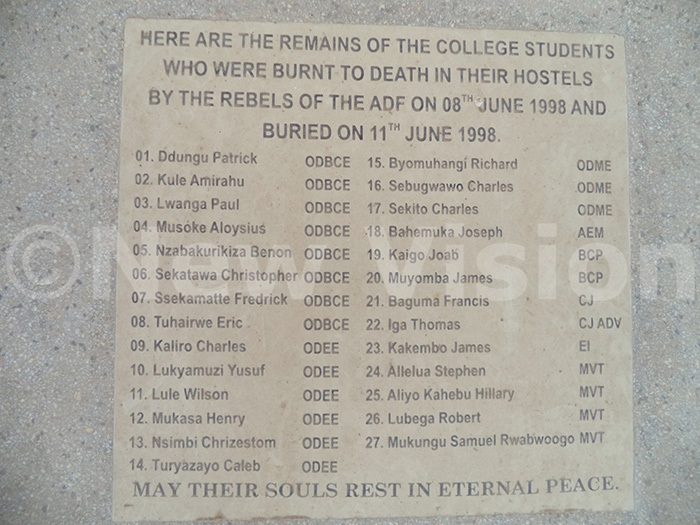Kicwamba massacre: 20 years later survivors await Government compensation
Jun 12, 2018
Two decades on, it still remains unknown when the Government will come up and compensate victims.

PIC: The current Kicwamba Technical Institute where students were burnt by the ADF rebels in 1998. (Credit: Geoffrey Mutegeki)
WHERE IS OUR COMPENSATION?
REBEL ACTIVITY- It is exactly 20 years, since the Allied Democratic Forces (ADF) attacked Kicwamba Technical College, in Kabarole district, burning 80 students to death and abducting more than 100.
On June 8, 1998, ADF rebels commanded by Jamil Mukulu descended on the innocent students and massacred them mercilessly. Mukulu has since been arrested and detained by the Ugandan government.
The rebels locked the students in their dormitories before setting them on fire. Twenty-seven students who were burnt beyond recognition were buried in a mass grave at the college. The grave bears the names of all the 27 students who were buried there.
Although some student escaped and survived the attack, they remain haunted by the bad experience.
Following the attack, the Government reportedly promised to compensate the victims, but 20 years later, victims are still waiting.
Some of the survivors are accusing the Government of failing to fulfill its promise of compensating them and instead compensating the rebels.
James Burolerwo, a survivor of the attack, blames the Government for sidelining the survivors and compensating the rebels by granting them amnesty and recruiting some of them in the army.
"I spent six months in rebel captivity. I was rescued by UPDF and the Government promised us compensation which never came to pass," Burolerwo says.
Rogers Kanti, who works in Masindi as a businessman, is a former vice guild president and survivor of the massacre. He says the Government has neglected the survivors by failing to compensate them.
At the time of the attack, Kanti was a first year student offering agricultural engineering mechanics.
"This Government does not care about the lives of its people. Many of my colleagues got bad injuries which left them incapacitated. They had hope in the Government to at least compensate them, but this did not happen," Kanti says.
"One wonders if really this Government knows the pain we still carry. Families have never healed and the Government's negligence pains more," Kanti says.
Many of the survivors struggled to go back to school after the nasty incident.
During the 2016 presidential election campaign, President Yoweri Museveni promised to compensate victims of the ADF rebel attacks.
"I am going to send the Prime Minister to oversee the compensation process," Museveni said while he campaigned in Kasese.

An inscription on the mass grave of the 27 students of Kicwamba Techinical College who were burnt to death by ADF in 1998. (Credit: Geoffrey Mutegeki)
Two decades on, it still remains unknown when the Government will come up and compensate victims.
The Prime Minister, Ruhakana Rugunda, when contacted, acknowledged that although the Government has taken long to fulfill the promise, it has not forgotten and will soon compensate them.
"The Government is fully aware of the commitment it made and will compensate the victims when the funds are available. The Government gradually fulfills these promises and it will be handled," Rugunda said.
He said the Kicwamba attack was not an atrocity on the parents and students of Kicwamba alone, but on all the people of Uganda and can never be isolated.
"We stand with the survivors and their families," Rugunda said.
The Government has since renovated the three dormitories that were burnt during the ADF attack and put up new structures.
Kicwamba is located in Kabarole district on the slopes of Rwenzori Mountain where the rebels used to operate. The college is about 14km from Fort Portal town.
It offers programmes leading to the award of National and Higher Diplomas in Engineering and ICT.
Currently, the college has over 500 students. Security has been tightened with a permanent army Détaché at the school premises.
The ADF is a rebel group which operated in western Uganda in the Rwenzori mountains and caused a lot of havoc in the nineties, resulting in the suffering of the population in the area.
They committed atrocities against the local civilian population, driving them from their homes and farms in the mountains into lowland towns.
The group was defeated by the Uganda People's Defence Forces (UPDF) and its remnants forced to DR Congo.
Several members of the rebel outfit have surrendered or were captured while majority were killed by the army.
Survivor's tale
Kanti
I was woken up by gun shots at around 5:00am. A few bullets were shot in our dormitory, but they never hurt the students. In other dormitories I would hear students yelling with their dormitories covered with smoke.
We kept locked into the dormitory up to 8:30am when the UPDF neutralised the rebels and opened for us. But we were full of fear not sure of what would happen again.
By the time the rebels were neutralised, 80 students were already killed, 100 abducted.
The scenes were nasty, I saw my friends' bodies burnt beyond recognition. Others who were badly burnt, but still alive were rushed to hospital. I remember using my jacket to carry Joshua Luyimbazi, who was badly burnt. God should have not let such a thing to happen.
I never went back; I was taken to Uganda Polytechnic Kyambogo (UPK) where I completed my course. I would always get nightmares dreaming of those horrific scenes. Until now I've never come to terms with what happened.
